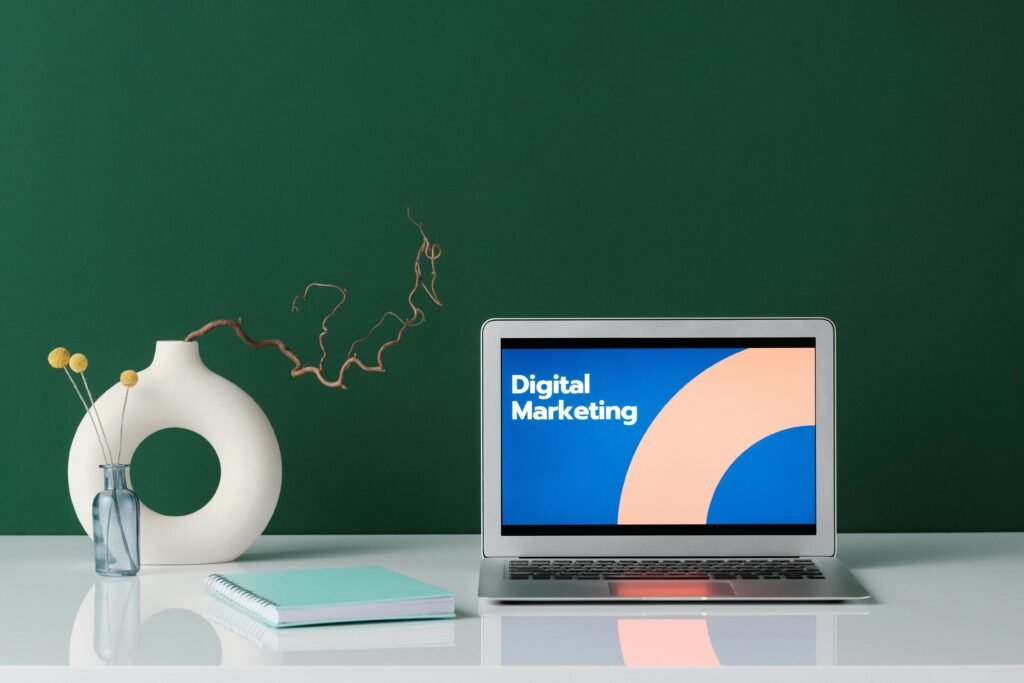Digital advertising is a global industry worth billions of dollars, encompassing thousands of small, medium, and large companies that spend considerable amounts on advertising each year. In today’s digital landscape, digital marketing has become a crucial component of business strategies aimed at growth. Businesses of all sizes, from small enterprises to large multinational corporations, rely on digital marketing to connect with their target audience. This targeting is based on audience behavior, interests, demographics, and geolocation, ultimately enhancing brand awareness, fostering brand loyalty, and driving sales.
What is Digital Marketing and Why Is It Crucial for Business Success

Digital marketing, often referred to as online marketing, involves the strategies that advertisers use to promote their products or services. This is done by running advertising campaigns on websites or apps, targeting specific audiences through electronic devices such as mobile phones, tablets, computers, and televisions via the internet.
Digital marketing allows brands and businesses to engage with potential customers in real-time. It enables them to analyze consumer behavior through advertising campaign data and make informed decisions to improve their marketing efforts. The main objectives are to connect with users in a personalized and meaningful way, increase brand visibility, and drive measurable results, ultimately leading to greater awareness and sales.
Why Digital Marketing is Important for Reaching Today’s Online Consumers
The significance of digital marketing has increased dramatically over the past decade. As more consumers rely on the internet for information, shopping, and entertainment, businesses must adapt to this trend to remain competitive. Here are several reasons why digital marketing is essential for business success today.
1. Wider Reach and Global Accessibility
As internet usage continues to rise, with billions of people online worldwide, digital marketing provides advertisers the opportunity to reach their targeted audiences on a global scale. Whether you operate a small restaurant or a multinational corporation, digital marketing allows you to connect with potential customers from around the world at a minimal cost.
2. Cost-Effectiveness
Traditional marketing methods, such as television ads, print media, and billboards, can be prohibitively expensive. Advertisers used to spend large amounts of money on their advertising campaigns before the invention of the internet. However, as the internet and associated software have developed, digital marketing has emerged as a more affordable option for businesses of all sizes. Marketing Methods like social media marketing, email campaigns, programmatic advertising, and content creation can deliver better results with minimal investment, making digital marketing a budget-friendly choice for small businesses and startups.
3. Targeted Marketing
The advantages of digital marketing is its ability to target specific audiences based on various factors, such as geolocation, demographics (including age and gender), interests, and online behavior. Using platforms like Facebook, Google, and Instagram, businesses can run highly focused campaigns that reach individuals most likely to be interested in their products or services. For example, a brand like Nike may run digital marketing campaigns targeting users aged 18 to 35, specifically males located in the United States.
4. Real-Time Analytics and Insights

Businesses can run their advertising campaigns across various software and platforms while tracking every aspect in real time with digital marketing. By pulling reports and analyzing campaign data, businesses can determine which ads are performing well and identify the demographics most interested in their products. Tools like Google Analytics and social media insights provide valuable information on user behavior, traffic sources, conversion rates, and more. This enables businesses to make quick adjustments to their campaigns, improving performance and increasing their return on investment.
5. Engagement and Communication
Online marketing differs from traditional marketing in that it fosters two-way communication. Instead of a one-way exchange of information, digital marketing enables businesses to engage directly with their customers. Through channels such as comments, direct messages, and reviews, companies can interact with their audience, respond to inquiries, and cultivate a loyal customer base.
6. Improved Customer Experience
Digital marketing allows businesses to create personalized experiences for their customers. Through tools like email automation, retargeting ads, and dynamic website content, companies can customize their messages for individual customers, making their marketing efforts feel more relevant and timely.
Types of Digital Marketing: Key Strategies to Boost Your Business
Digital marketing encompasses various techniques and platforms, making it a broad field. Here’s a breakdown of some of the most popular and effective types of digital marketing.
1. Search Engine Optimization (SEO)
SEO, or Search Engine Optimization, is the process of improving your website and its content to achieve higher rankings in search engine results pages. Since most online experiences start with a search engine query as people search for something on search engines every day. SEO is essential for driving organic traffic to your website.
On-Page SEO
This involves optimizing elements such as titles, meta descriptions, headers, and content to include relevant keywords.
Off-Page SEO
This focuses on building backlinks from reputable websites and improving your site’s domain authority.
2. Social Media Marketing (SMM)
Social media marketing involves utilizing platforms such as Facebook, Instagram, Twitter, LinkedIn, and TikTok to promote the brand products or services and engage with potential customers. It enables businesses to build brand awareness, foster relationships, and create viral campaigns that spread rapidly among followers.
Organic Social Media
This approach includes posting regular updates, sharing content, and engaging with followers without paying for advertisements.
Paid Social Media Ads
This strategy involves running targeted advertisements on social media platforms, allowing you to reach a highly specific audience based on their interests, demographics, and behavior.
3. Content Marketing
Publishers create content for their websites, which are categorized by topics such as Marketing, News, Travel, Finance, Health, and more. Content marketing involves producing valuable, relevant, and consistent content to attract and engage a specific target audience. The aim is to provide helpful information that addresses customer problems or entertains them, thereby positioning your business as an authority in the industry.
Blog Posts
Informative articles that focus on specific keywords and address common customer questions.
Videos
Engaging content shared on platforms like YouTube or embedded on websites.
4. Email Marketing
Email marketing is one of the most effective ways to communicate directly with customers. Whether you are sending newsletters, promotional offers, or transactional emails, this approach allows you to reach your audience directly in their inbox.
Personalized Emails
Customizing messages based on the recipient’s behavior or preferences.
Automated Campaigns
Setting up email sequences that are triggered by user actions, such as abandoned cart reminders.
Segmented Lists
Divide your email list into groups based on demographics or purchase behavior to send more targeted emails.
5. Pay-Per-Click (PPC) Advertising
PPC advertising, or pay-per-click advertising, involves paying for ads that appear in search engine results or on social media platforms. With PPC, you only pay when someone clicks on your ad, making it a cost-effective way to drive targeted traffic to your website. Some of the most popular PPC platforms include Google Ads, Facebook Ads, and LinkedIn Ads. PPC campaigns can be highly effective for businesses seeking to generate immediate results and increase website traffic.
6. Affiliate Marketing
Affiliate marketing is a performance-based strategy in which businesses collaborate with individuals or other companies, known as affiliates, to promote their products or services. Affiliates earn a commission for each sale or lead they generate. This model benefits businesses by allowing them to extend their reach without the need for significant advertising investments. For affiliates, it offers a way to earn passive income by promoting products they genuinely believe in.
7. Influencer Marketing
Influencer marketing is the practice of partnering with individuals who have a substantial following on social media or blogs to promote a product or service. By recommending products to their followers, influencers can help businesses reach a wider and more targeted audience, as their followers often trust their opinions. This form of marketing has gained significant popularity in industries such as fashion, beauty, fitness, and lifestyle.
Career Opportunities in Digital Marketing: How to Get Started
As businesses increasingly adopt digital marketing strategies, the demand for skilled professionals in this area has surged. Digital marketing provides a diverse array of career opportunities, whether you wish to work for a large corporation or establish your own agency. Here are some of the most popular careers in digital marketing.

1. Digital Marketing Manager
A digital marketing manager oversees all digital marketing strategies for a business or client. They are responsible for planning, executing, and monitoring campaigns across various channels, such as SEO, social media, content marketing, email, and paid advertising. This role requires strong leadership, strategic thinking, and an understanding of analytics.
2. SEO Specialist
An SEO specialist focuses on optimizing websites and content to achieve higher rankings in search engine results. They conduct keyword research, optimize on-page elements, and build backlinks to enhance a website’s visibility and organic traffic. SEO specialists must stay updated on the latest algorithm changes and industry trends.
3. Content Writer/Creator
Content creators produce written blog posts, articles, video tutorials, social media posts or visual content that engages and informs an audience.
4. Social Media Manager
Social media managers are responsible for managing a brand’s presence on platforms such as Facebook, Instagram, LinkedIn, and Twitter. They create and curate content, respond to customer inquiries, and track social media performance.
5. PPC Specialist
A PPC specialist manages paid advertising campaigns, ensuring that ads reach the right audience and provide a positive return on investment (ROI). They conduct keyword research, create ad copy, and analyze campaign performance to optimize paid ads on platforms like Google Ads and Facebook Ads.
6. Email Marketing Specialist
An email marketing specialist designs and implements email campaigns to nurture leads, promote products, and increase sales. They segment email lists, create automated sequences, and track open and conversion rates to optimize campaign performance.
Make Money from Digital Marketing: Top Earning Opportunities You Should Know
Digital marketing is not just a career choice; it is also a profitable avenue for generating income through various online business models. Here are several ways to earn money using digital marketing.

1. Freelancing
One of the most popular ways to earn money in digital marketing is through freelancing. You can offer services such as SEO, content creation, social media management, PPC, or email marketing to clients who need expert help. Platforms like Upwork, Freelancer, and Fiverr make it easy to find clients and start earning income.
2. Affiliate Marketing
Affiliate marketing allows you to earn commissions by promoting other businesses’ products. You can join affiliate programs offered by companies such as Amazon, ClickBank, and ShareASale. When someone clicks on your affiliate link and makes a purchase, you earn a percentage of the sale.
3. Create and Sell Online Courses
If you have expertise in a specific area of digital marketing (such as SEO or social media marketing), you can create and sell online courses. Platforms like Udemy, Teachable, and Skillshare enable you to create and monetize educational content.
4. Start a Blog or YouTube Channel
Another way to generate income from digital marketing is by creating content that attracts a large audience. Once you’ve built an audience through blogging or YouTube videos, you can monetize your platform with ads, sponsored posts, and affiliate marketing.
5. E-commerce and Dropshipping
Starting an e-commerce store or engaging in dropshipping can also be profitable. You can utilize digital marketing strategies like social media ads and Google Ads to promote your products, drive traffic to your site, and generate sales.
Conclusion
In today’s digital age, digital marketing has become an essential tool for both businesses and individuals. Its significance stems from its ability to provide a broader reach, more cost-effective strategies, and an array of tools for measuring and optimizing performance. Whether you’re looking to explore digital marketing for career advancement or seeking ways to monetize your skills, the opportunities are vast. By mastering various digital marketing strategies, you can tap into the potential to connect with your target audience, expand your business, and generate income from your expertise in this field.

